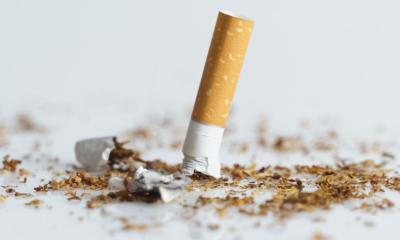
Image source: Shutterstock/ESB Professional / CDC/Alissa Eckert, MS (Mashup: HiE)
News • Dutch experts discuss
On the implications of the coronavirus
The coronavirus last week reached the Netherlands and began to spread around the country. How has the Dutch population reacted? What is a useful frame of reference for this situation? And what are the legal guidelines for dealing with the outbreak?
Four researchers from the University of Amsterdam (UvA) – a clinical microbiologist, an anthropologist, a social scientist and a health lawyer – explain the implications of the virus for the Netherlands, that largely apply to many other countries as well.
Q: Why are we more concerned about the coronairus than about other viruses?

Clinical microbiologist Constance Schultsz: ‘There have always been outbreaks of infectious diseases – well-known examples from history include the plague and the Spanish flu. In many infectious diseases that are new to humans, animals are the source of contamination, they are the so-called reservoir, from which transmission to humans took place. Human behaviour as a result of, for example cultural customs or trade, can influence the evolution of microorganisms such as viruses and bacteria. This can cause these microorganisms to change in such a way that they can not only infect humans, but also become transferable from person to person. This is probably what happened with COVID-19.
‘Over the past two decades, we've had several outbreaks of corona and flu viruses. Some of these were highly transferable from person to person, while others were limited to, for example, birds, the typical reservoir of flu viruses. That is why the worldwide warning and response to the coronavirus is not unique; we had a similar reaction to swine flu in 2009. The coronavirus seems easily transferable from person to person and that is why we are seeing it spread rapidly and why containment measures are so important. Because the virus is ‘new’ for people, our bodies have not yet made antibodies against it.’
Q: Why is so much attention given to the COVID-19 outbreak?

Anthropologist Danny de Vries: ‘From a social-scientific perspective, you see that the historical experience of populations with previous disease outbreaks determines how people respond to new ones. For people in Asia, the outbreak of SARS in 2002/2003 is a relevant frame of reference. Because they have already experienced such an outbreak, they may on the one hand be quicker to accept rigorous governmental measures, but on the other hand it may lead to overreactions because COVID-19 is not SARS.
‘In the Netherlands, our closest comparisons are the Mexican flu of 2009/2010, with a mortality rate of just 0.02%, and the regular flu epidemics, with an average mortality rate of 0.1%. Because the mortality rate for COVID-19 is much higher, there is uncertainty and concern about how this new risk to public health should be interpreted, which actors should be involved in the response, and what social adjustments should be made in our daily lives. Some may overreact, while others may swing too far the other way into of a level complacency. Communication about the risks to public health, such as in the 'Facts and Fables' broadcasts from the NOS [a dutch broadcasting institution], help to educate people about the level of risk. Yet, social pressures on behavior are difficult to reorient once they are established historically. It seems that the media is also on a learning curve. It started with a lot of hype and the 'othering' of the disease as something Chinese. Now that it appears to be a pandemic, the media are reflecting much more broadly about what this will mean for us all.’
Recommended article

News • Myths around SARS-CoV-2 busted
Coronavirus FAQ to dispel fake and harmful advice
The current outbreak of the novel coronavirus disease (COVID-19) is making headlines by the minute. However, some less-than-trustworthy advice can be found among the information. Understandably, many people are concerned and confused. To prevent unnecessary panic, the World Health Organisation (WHO) has assembled advice for the public. Is it safe to receive parcels from China? Will sesame oil…
Q: What do you think of the media reporting and information provision around the disease so far?

Social scientist Chris Pell: ‘With even experts struggling to keep pace with the rapidly developing circumstances and the science around the outbreak, it is not surprising that journalists are also running into problems.
‘To counteract the more spurious information circulating online and on social media, scientists increasingly try to communicate their messages in a more targeted manner to journalists and the general public. But with knowledge about the issue evolving rapidly, perceived inconsistencies are easily exploited by people who seek to stoke fears or get clicks.’
Q: Are we legally prepared for this outbreak?
Health lawyer Anniek de Ruijter: ‘The law restricts public authority and creates procedures to be followed for when governments want to act. In an emergency situation, however, there is usually no time to wait for lengthy legal proceedings and legislation. Sometimes the law can then prove an impediment to a rapid response. At the same time, of course, if there are no legal restrictions on the power of the government in the event of a health crisis, we may find we no longer have the rule of law once the crisis is over.

‘There are two legal ways of dealing with this dilemma in emergency situations in general. The first: we create an exception to the rule that we have to abide by legal procedures and laws, so that we can do what is necessary. When the epidemic is over, the previously applicable legal rules and procedures will come into effect again. The second: we do not create a state of exception, but instead legislate specifically for the emergency situation. This is the most commonly taken approach, but in the worldwide reactions to the coronavirus so far, we have also seen some situations that have more in common with the first approach. In any case, we have rules at the international level that require WHO Member States to take action in an emergency. They must do so following scientific advice from the WHO, and without unduly restricting trade. Then there are stricter rules at the EU level, where Member States can also decide to authorise the preparation of a pandemic vaccine and there is a system for buying those medications collectively. At the national level in the Netherlands, the rules are more far-reaching in the Public Health Act, which allows for compulsory medical examinations, quarantine and isolation measures to be ordered.'
Q: What if the law is not complied with because the emergency situation is so exceptional?
Even fundamental rights such as human dignity can help the government find the right balance between the difficult choices it has to make
Anniek de Ruijter
De Ruijter: ‘That is certainly possible. Governments may, if deemed absolutely necessary, decide not to follow the law. There are then principles that can give direction to the correct course of action. The ‘principle of precaution’ is recognised under the law. But if the principle of precaution were to be the only guideline for acting in an emergency situation, it could lead to a disproportionate exercise of power by the government, which may harm not only economic interests but also individual rights, such as physical integrity and privacy. Other principles can therefore also be taken into account, such as proportionality and solidarity, and even fundamental rights such as human dignity can help the government find the right balance between the difficult choices it has to make.’
Source: University of Amsterdam (UvA)
06.03.2020











